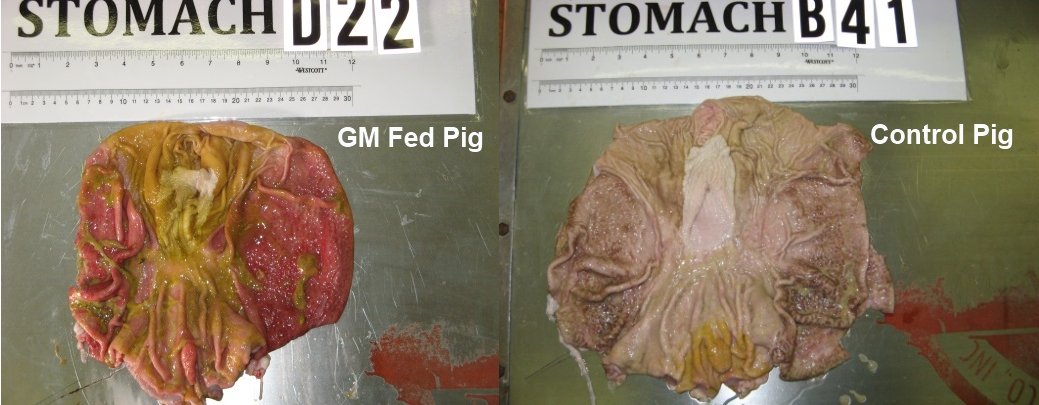Published in the Organic Systems Journal, the peer-reviewed study analyzed 168 just-weaned commercial pigs for 22.7 weeks, or just over 5 months. Half of the pigs were fed popular GM corn and soy varieties, while the other half were fed the same foods, only not GM (though it must have been difficult to find non-GM corn and soy since the vast majority of these two crops are indeed GM).
What the researchers found was startling:
“We found that the level of severe inflammation in stomachs was markedly higher in pigs fed the GM diet. Pigs on the GM diet were 2.6 times more likely to get severe stomach inflammation than control pigs. Males were more strongly affected. While female pigs were 2.2 times more likely to get severe stomach inflammation when on the GM diet, males were 4 times more likely. These findings are both biologically significant and statistically significant.”
Lead researcher Dr. Judy Carman, adjunct associate professor at Flinders University, Adelaide, Australia, noted numerous reasons why this study and the findings are important.
- 1. The results were found using real-life, on-farm condition, as opposed to in a laboratory. Plus, strict scientific controls were able to be used that aren’t on farms normally.
- 2. Pigs are consumed by the mass population, so any issues in the pigs may affect the consumer.
- 3. The digestive system of pigs are similar to a human’s digestive system, which causes even greater concern.
- 4. The health complications were the result of crops containing multiple (3) GM genes and the GM proteins that are produced by the crops. Not one food regulator requires that these be tested for safety.
“Our results provide clear evidence that regulators need to safety assess GM crops containing mixtures of GM genes, regardless of whether those genes occur in the one GM plant or in a mixture of GM plants eaten in the same meal, even if regulators have already assessed GM plants containing single GM genes in the mixture…In my experience, farmers have found increased production costs and escalating antibiotic use when feeding GM crops. In some operations, the livestock death loss is high, and there are unexplained problems including spontaneous abortions, deformities of new-born animals, and an overall listlessness and lack of contentment in the animals,” Dr. Carman said.

Interestingly, and not surprisingly, this is not the first piece of research to find complications arising from GM food consumption. One French GMO study concluded that rats fed a lifelong diet consisting of genetically modified corn suffered serious consequences, including tumor development, heavy amounts of damage to multiple organs, and premature death. This isn’t surprising, seeing as one analysis found Monsanto’s GM corn to be nutritionally dead and highly toxic.
Another study found that feeding hamsters GMO soy results in higher rates of infant mortality and causes fertility problems.
“In some cases, animals eating GM crops are very aggressive. This is not surprising, given the scale of stomach irritation and inflammation now documented. I have seen no financial benefit to farmers who feed GM crops to their animals,” said Dr. Carmen.

 According to a new groundbreaking report analyzing the effects of GM feed on animals, scientists
According to a new groundbreaking report analyzing the effects of GM feed on animals, scientists
You need to be a member of 12160 Social Network to add comments!
Join 12160 Social Network